Analyzing the Impact of Earnings Management Acts on Financial Reports
VerifiedAdded on 2023/06/15
|5
|1403
|81
Essay
AI Summary
This essay delves into the impact of earnings management practices on the credibility of financial reports. It highlights how managers might manipulate financial statements to serve their interests, potentially misleading stakeholders. The essay uses the Enron scandal as a prime example of corporate failure due to earnings management. It discusses how such practices can involve inflating turnover, concealing losses, and misusing off-balance sheet financing, ultimately affecting stakeholder decisions and corporate governance. The essay concludes that while not always illegal, earnings management can significantly undermine the authenticity of financial information, emphasizing the importance of corporate governance in curbing fraudulent practices. Desklib offers students access to this essay and many other resources to aid in their studies.
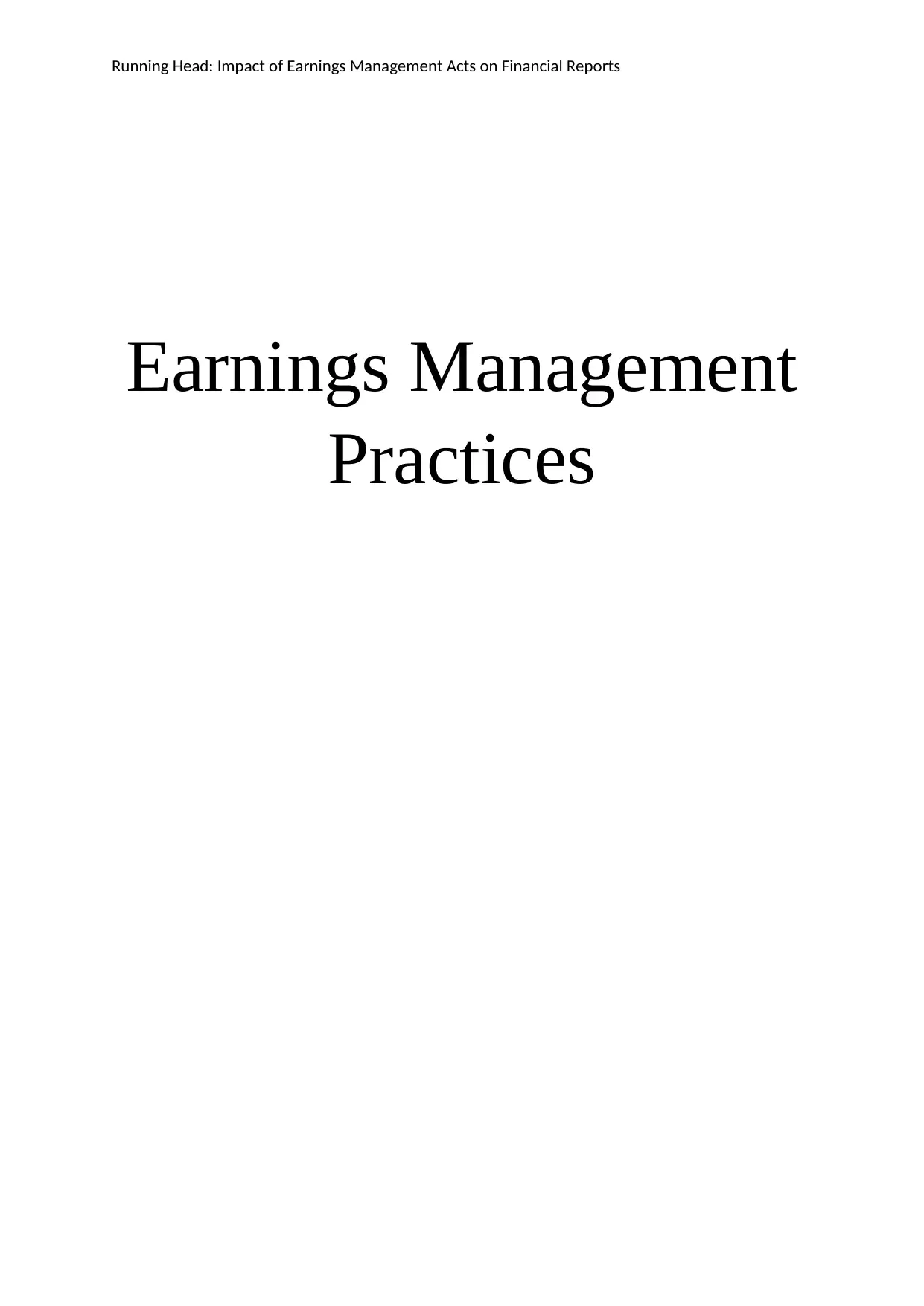
Running Head: Impact of Earnings Management Acts on Financial Reports
Earnings Management
Practices
Earnings Management
Practices
Paraphrase This Document
Need a fresh take? Get an instant paraphrase of this document with our AI Paraphraser
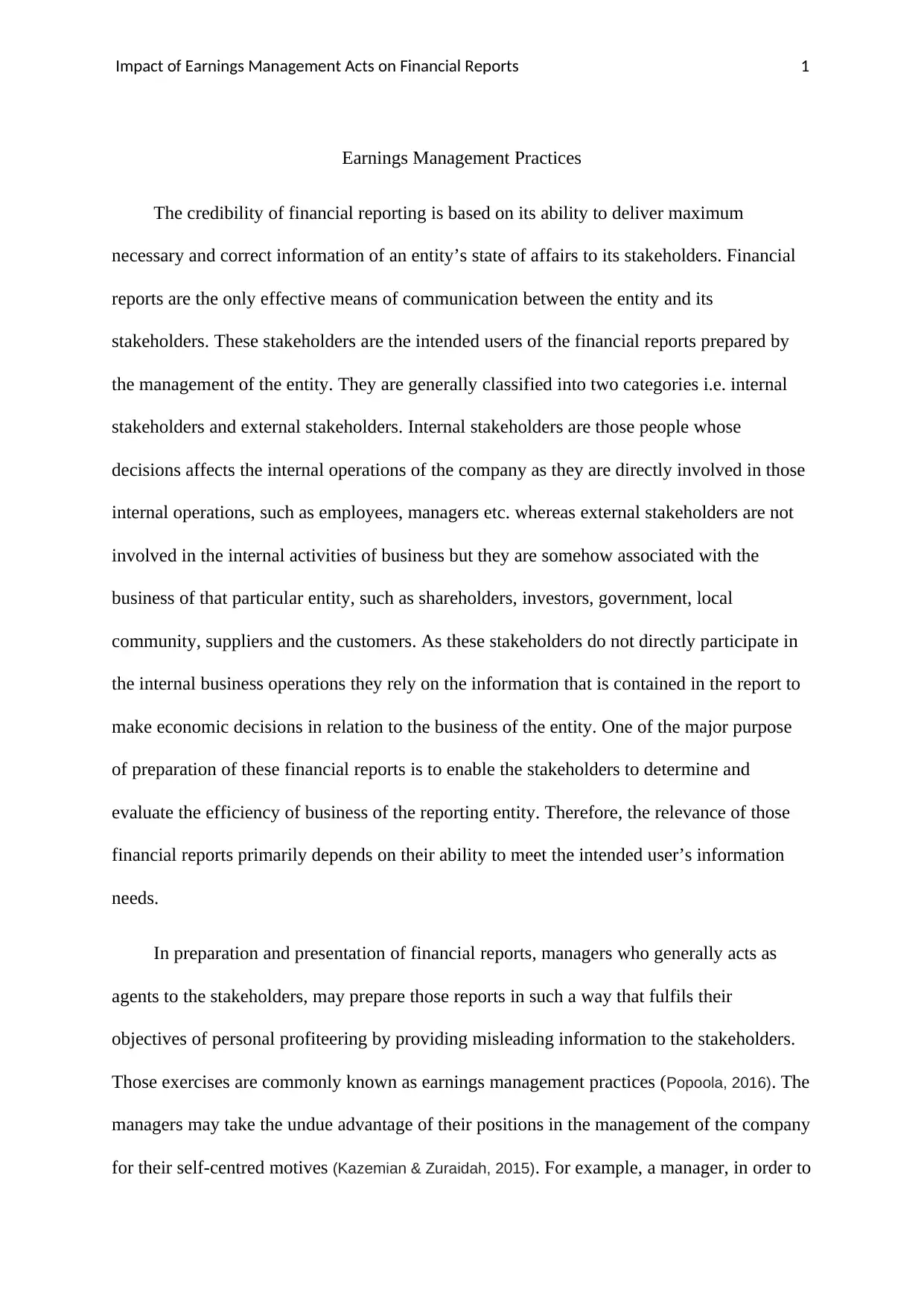
Impact of Earnings Management Acts on Financial Reports 1
Earnings Management Practices
The credibility of financial reporting is based on its ability to deliver maximum
necessary and correct information of an entity’s state of affairs to its stakeholders. Financial
reports are the only effective means of communication between the entity and its
stakeholders. These stakeholders are the intended users of the financial reports prepared by
the management of the entity. They are generally classified into two categories i.e. internal
stakeholders and external stakeholders. Internal stakeholders are those people whose
decisions affects the internal operations of the company as they are directly involved in those
internal operations, such as employees, managers etc. whereas external stakeholders are not
involved in the internal activities of business but they are somehow associated with the
business of that particular entity, such as shareholders, investors, government, local
community, suppliers and the customers. As these stakeholders do not directly participate in
the internal business operations they rely on the information that is contained in the report to
make economic decisions in relation to the business of the entity. One of the major purpose
of preparation of these financial reports is to enable the stakeholders to determine and
evaluate the efficiency of business of the reporting entity. Therefore, the relevance of those
financial reports primarily depends on their ability to meet the intended user’s information
needs.
In preparation and presentation of financial reports, managers who generally acts as
agents to the stakeholders, may prepare those reports in such a way that fulfils their
objectives of personal profiteering by providing misleading information to the stakeholders.
Those exercises are commonly known as earnings management practices (Popoola, 2016). The
managers may take the undue advantage of their positions in the management of the company
for their self-centred motives (Kazemian & Zuraidah, 2015). For example, a manager, in order to
Earnings Management Practices
The credibility of financial reporting is based on its ability to deliver maximum
necessary and correct information of an entity’s state of affairs to its stakeholders. Financial
reports are the only effective means of communication between the entity and its
stakeholders. These stakeholders are the intended users of the financial reports prepared by
the management of the entity. They are generally classified into two categories i.e. internal
stakeholders and external stakeholders. Internal stakeholders are those people whose
decisions affects the internal operations of the company as they are directly involved in those
internal operations, such as employees, managers etc. whereas external stakeholders are not
involved in the internal activities of business but they are somehow associated with the
business of that particular entity, such as shareholders, investors, government, local
community, suppliers and the customers. As these stakeholders do not directly participate in
the internal business operations they rely on the information that is contained in the report to
make economic decisions in relation to the business of the entity. One of the major purpose
of preparation of these financial reports is to enable the stakeholders to determine and
evaluate the efficiency of business of the reporting entity. Therefore, the relevance of those
financial reports primarily depends on their ability to meet the intended user’s information
needs.
In preparation and presentation of financial reports, managers who generally acts as
agents to the stakeholders, may prepare those reports in such a way that fulfils their
objectives of personal profiteering by providing misleading information to the stakeholders.
Those exercises are commonly known as earnings management practices (Popoola, 2016). The
managers may take the undue advantage of their positions in the management of the company
for their self-centred motives (Kazemian & Zuraidah, 2015). For example, a manager, in order to
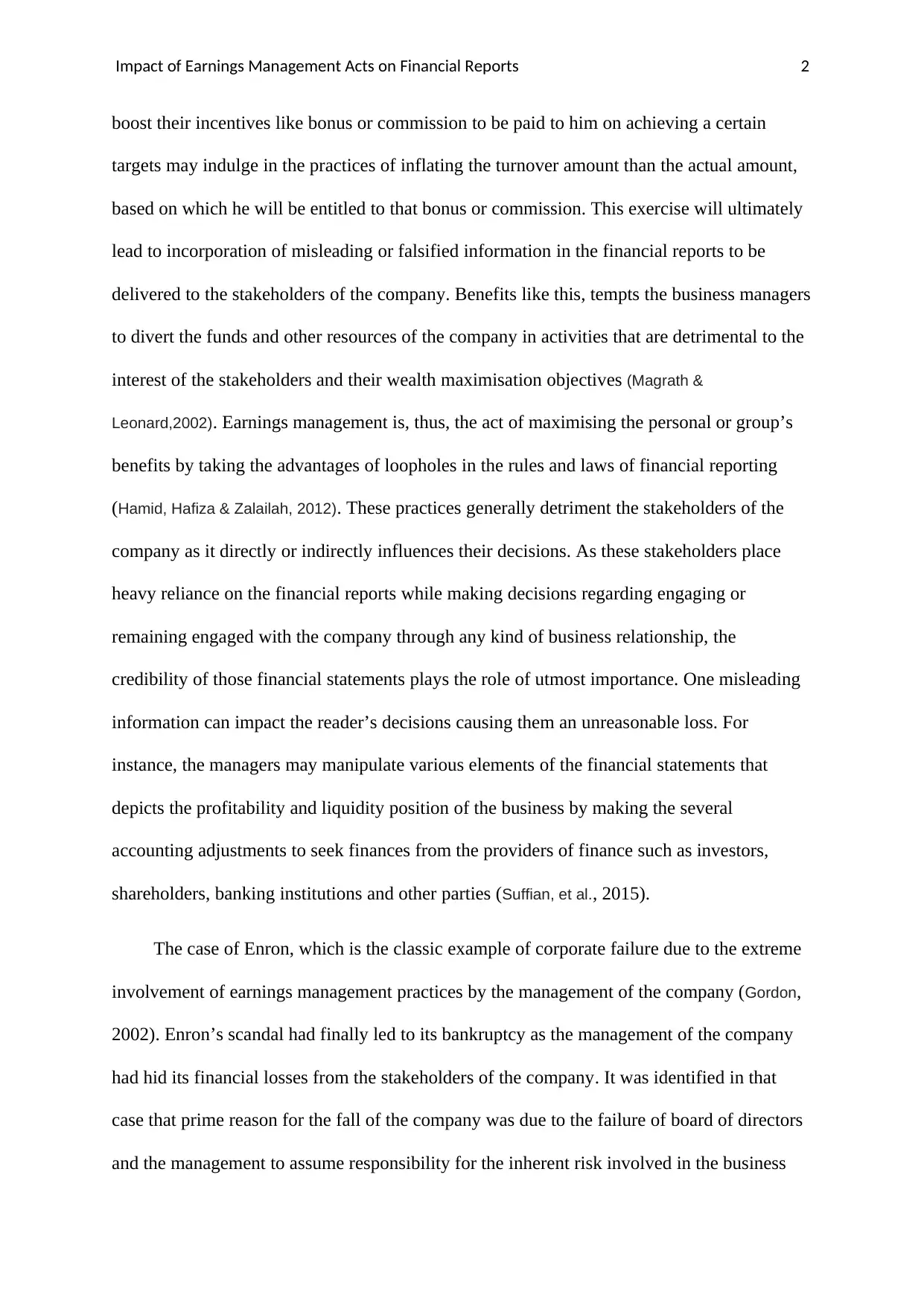
Impact of Earnings Management Acts on Financial Reports 2
boost their incentives like bonus or commission to be paid to him on achieving a certain
targets may indulge in the practices of inflating the turnover amount than the actual amount,
based on which he will be entitled to that bonus or commission. This exercise will ultimately
lead to incorporation of misleading or falsified information in the financial reports to be
delivered to the stakeholders of the company. Benefits like this, tempts the business managers
to divert the funds and other resources of the company in activities that are detrimental to the
interest of the stakeholders and their wealth maximisation objectives (Magrath &
Leonard,2002). Earnings management is, thus, the act of maximising the personal or group’s
benefits by taking the advantages of loopholes in the rules and laws of financial reporting
(Hamid, Hafiza & Zalailah, 2012). These practices generally detriment the stakeholders of the
company as it directly or indirectly influences their decisions. As these stakeholders place
heavy reliance on the financial reports while making decisions regarding engaging or
remaining engaged with the company through any kind of business relationship, the
credibility of those financial statements plays the role of utmost importance. One misleading
information can impact the reader’s decisions causing them an unreasonable loss. For
instance, the managers may manipulate various elements of the financial statements that
depicts the profitability and liquidity position of the business by making the several
accounting adjustments to seek finances from the providers of finance such as investors,
shareholders, banking institutions and other parties (Suffian, et al., 2015).
The case of Enron, which is the classic example of corporate failure due to the extreme
involvement of earnings management practices by the management of the company (Gordon,
2002). Enron’s scandal had finally led to its bankruptcy as the management of the company
had hid its financial losses from the stakeholders of the company. It was identified in that
case that prime reason for the fall of the company was due to the failure of board of directors
and the management to assume responsibility for the inherent risk involved in the business
boost their incentives like bonus or commission to be paid to him on achieving a certain
targets may indulge in the practices of inflating the turnover amount than the actual amount,
based on which he will be entitled to that bonus or commission. This exercise will ultimately
lead to incorporation of misleading or falsified information in the financial reports to be
delivered to the stakeholders of the company. Benefits like this, tempts the business managers
to divert the funds and other resources of the company in activities that are detrimental to the
interest of the stakeholders and their wealth maximisation objectives (Magrath &
Leonard,2002). Earnings management is, thus, the act of maximising the personal or group’s
benefits by taking the advantages of loopholes in the rules and laws of financial reporting
(Hamid, Hafiza & Zalailah, 2012). These practices generally detriment the stakeholders of the
company as it directly or indirectly influences their decisions. As these stakeholders place
heavy reliance on the financial reports while making decisions regarding engaging or
remaining engaged with the company through any kind of business relationship, the
credibility of those financial statements plays the role of utmost importance. One misleading
information can impact the reader’s decisions causing them an unreasonable loss. For
instance, the managers may manipulate various elements of the financial statements that
depicts the profitability and liquidity position of the business by making the several
accounting adjustments to seek finances from the providers of finance such as investors,
shareholders, banking institutions and other parties (Suffian, et al., 2015).
The case of Enron, which is the classic example of corporate failure due to the extreme
involvement of earnings management practices by the management of the company (Gordon,
2002). Enron’s scandal had finally led to its bankruptcy as the management of the company
had hid its financial losses from the stakeholders of the company. It was identified in that
case that prime reason for the fall of the company was due to the failure of board of directors
and the management to assume responsibility for the inherent risk involved in the business
⊘ This is a preview!⊘
Do you want full access?
Subscribe today to unlock all pages.

Trusted by 1+ million students worldwide
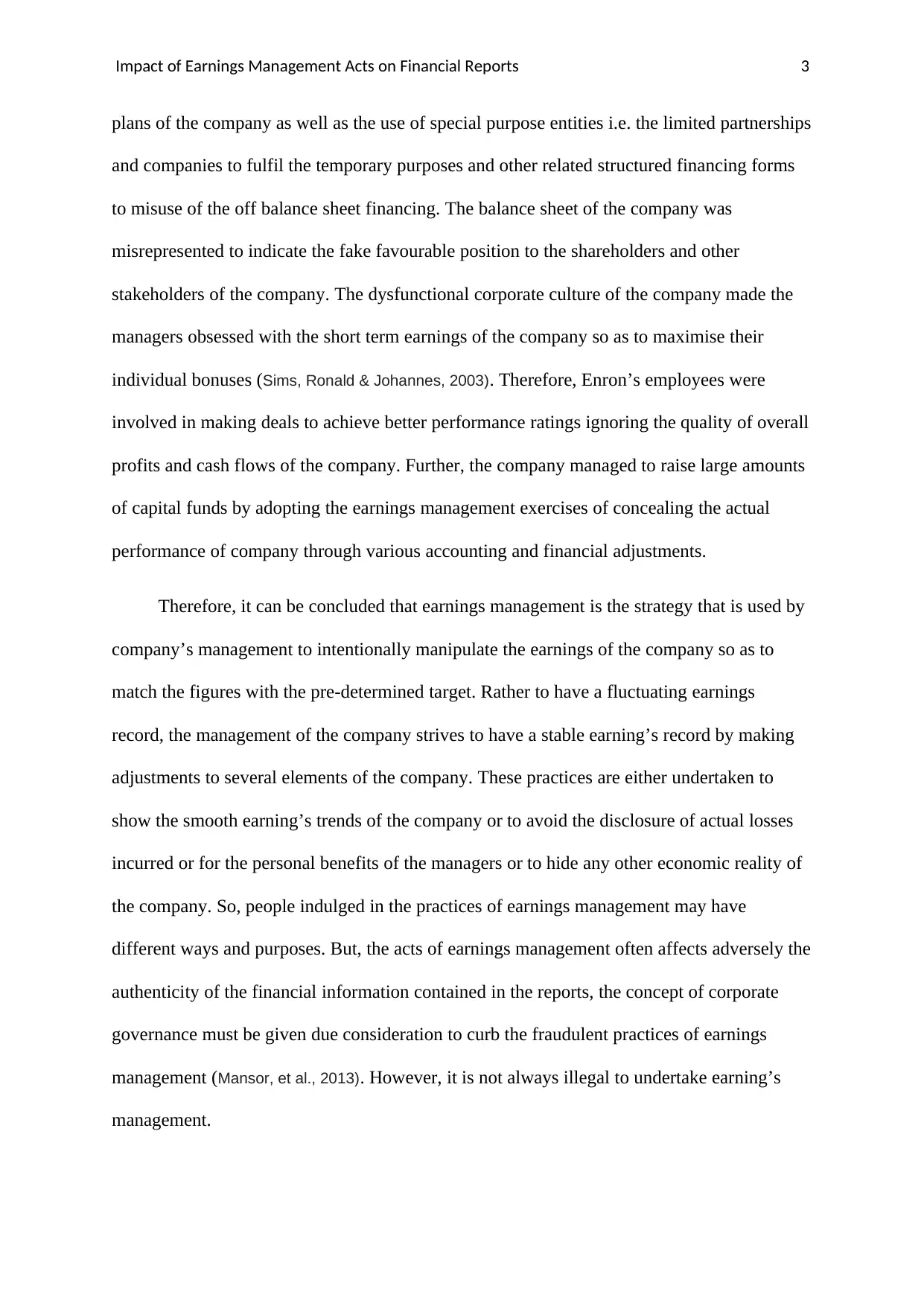
Impact of Earnings Management Acts on Financial Reports 3
plans of the company as well as the use of special purpose entities i.e. the limited partnerships
and companies to fulfil the temporary purposes and other related structured financing forms
to misuse of the off balance sheet financing. The balance sheet of the company was
misrepresented to indicate the fake favourable position to the shareholders and other
stakeholders of the company. The dysfunctional corporate culture of the company made the
managers obsessed with the short term earnings of the company so as to maximise their
individual bonuses (Sims, Ronald & Johannes, 2003). Therefore, Enron’s employees were
involved in making deals to achieve better performance ratings ignoring the quality of overall
profits and cash flows of the company. Further, the company managed to raise large amounts
of capital funds by adopting the earnings management exercises of concealing the actual
performance of company through various accounting and financial adjustments.
Therefore, it can be concluded that earnings management is the strategy that is used by
company’s management to intentionally manipulate the earnings of the company so as to
match the figures with the pre-determined target. Rather to have a fluctuating earnings
record, the management of the company strives to have a stable earning’s record by making
adjustments to several elements of the company. These practices are either undertaken to
show the smooth earning’s trends of the company or to avoid the disclosure of actual losses
incurred or for the personal benefits of the managers or to hide any other economic reality of
the company. So, people indulged in the practices of earnings management may have
different ways and purposes. But, the acts of earnings management often affects adversely the
authenticity of the financial information contained in the reports, the concept of corporate
governance must be given due consideration to curb the fraudulent practices of earnings
management (Mansor, et al., 2013). However, it is not always illegal to undertake earning’s
management.
plans of the company as well as the use of special purpose entities i.e. the limited partnerships
and companies to fulfil the temporary purposes and other related structured financing forms
to misuse of the off balance sheet financing. The balance sheet of the company was
misrepresented to indicate the fake favourable position to the shareholders and other
stakeholders of the company. The dysfunctional corporate culture of the company made the
managers obsessed with the short term earnings of the company so as to maximise their
individual bonuses (Sims, Ronald & Johannes, 2003). Therefore, Enron’s employees were
involved in making deals to achieve better performance ratings ignoring the quality of overall
profits and cash flows of the company. Further, the company managed to raise large amounts
of capital funds by adopting the earnings management exercises of concealing the actual
performance of company through various accounting and financial adjustments.
Therefore, it can be concluded that earnings management is the strategy that is used by
company’s management to intentionally manipulate the earnings of the company so as to
match the figures with the pre-determined target. Rather to have a fluctuating earnings
record, the management of the company strives to have a stable earning’s record by making
adjustments to several elements of the company. These practices are either undertaken to
show the smooth earning’s trends of the company or to avoid the disclosure of actual losses
incurred or for the personal benefits of the managers or to hide any other economic reality of
the company. So, people indulged in the practices of earnings management may have
different ways and purposes. But, the acts of earnings management often affects adversely the
authenticity of the financial information contained in the reports, the concept of corporate
governance must be given due consideration to curb the fraudulent practices of earnings
management (Mansor, et al., 2013). However, it is not always illegal to undertake earning’s
management.
Paraphrase This Document
Need a fresh take? Get an instant paraphrase of this document with our AI Paraphraser
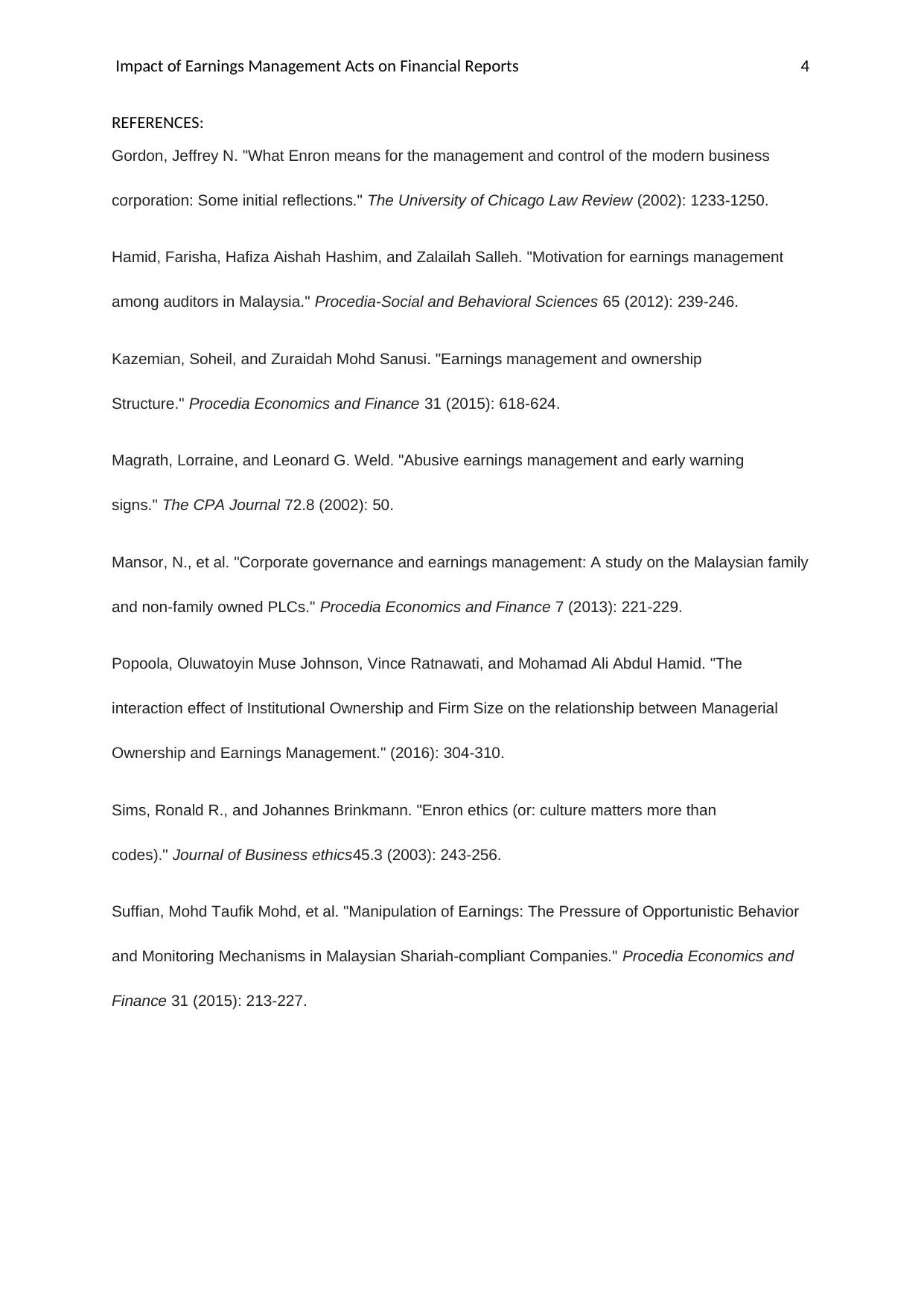
Impact of Earnings Management Acts on Financial Reports 4
REFERENCES:
Gordon, Jeffrey N. "What Enron means for the management and control of the modern business
corporation: Some initial reflections." The University of Chicago Law Review (2002): 1233-1250.
Hamid, Farisha, Hafiza Aishah Hashim, and Zalailah Salleh. "Motivation for earnings management
among auditors in Malaysia." Procedia-Social and Behavioral Sciences 65 (2012): 239-246.
Kazemian, Soheil, and Zuraidah Mohd Sanusi. "Earnings management and ownership
Structure." Procedia Economics and Finance 31 (2015): 618-624.
Magrath, Lorraine, and Leonard G. Weld. "Abusive earnings management and early warning
signs." The CPA Journal 72.8 (2002): 50.
Mansor, N., et al. "Corporate governance and earnings management: A study on the Malaysian family
and non-family owned PLCs." Procedia Economics and Finance 7 (2013): 221-229.
Popoola, Oluwatoyin Muse Johnson, Vince Ratnawati, and Mohamad Ali Abdul Hamid. "The
interaction effect of Institutional Ownership and Firm Size on the relationship between Managerial
Ownership and Earnings Management." (2016): 304-310.
Sims, Ronald R., and Johannes Brinkmann. "Enron ethics (or: culture matters more than
codes)." Journal of Business ethics45.3 (2003): 243-256.
Suffian, Mohd Taufik Mohd, et al. "Manipulation of Earnings: The Pressure of Opportunistic Behavior
and Monitoring Mechanisms in Malaysian Shariah-compliant Companies." Procedia Economics and
Finance 31 (2015): 213-227.
REFERENCES:
Gordon, Jeffrey N. "What Enron means for the management and control of the modern business
corporation: Some initial reflections." The University of Chicago Law Review (2002): 1233-1250.
Hamid, Farisha, Hafiza Aishah Hashim, and Zalailah Salleh. "Motivation for earnings management
among auditors in Malaysia." Procedia-Social and Behavioral Sciences 65 (2012): 239-246.
Kazemian, Soheil, and Zuraidah Mohd Sanusi. "Earnings management and ownership
Structure." Procedia Economics and Finance 31 (2015): 618-624.
Magrath, Lorraine, and Leonard G. Weld. "Abusive earnings management and early warning
signs." The CPA Journal 72.8 (2002): 50.
Mansor, N., et al. "Corporate governance and earnings management: A study on the Malaysian family
and non-family owned PLCs." Procedia Economics and Finance 7 (2013): 221-229.
Popoola, Oluwatoyin Muse Johnson, Vince Ratnawati, and Mohamad Ali Abdul Hamid. "The
interaction effect of Institutional Ownership and Firm Size on the relationship between Managerial
Ownership and Earnings Management." (2016): 304-310.
Sims, Ronald R., and Johannes Brinkmann. "Enron ethics (or: culture matters more than
codes)." Journal of Business ethics45.3 (2003): 243-256.
Suffian, Mohd Taufik Mohd, et al. "Manipulation of Earnings: The Pressure of Opportunistic Behavior
and Monitoring Mechanisms in Malaysian Shariah-compliant Companies." Procedia Economics and
Finance 31 (2015): 213-227.
1 out of 5
Related Documents
Your All-in-One AI-Powered Toolkit for Academic Success.
+13062052269
info@desklib.com
Available 24*7 on WhatsApp / Email
![[object Object]](/_next/static/media/star-bottom.7253800d.svg)
Unlock your academic potential
Copyright © 2020–2025 A2Z Services. All Rights Reserved. Developed and managed by ZUCOL.




